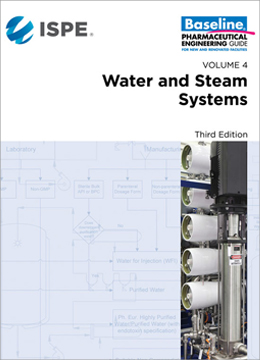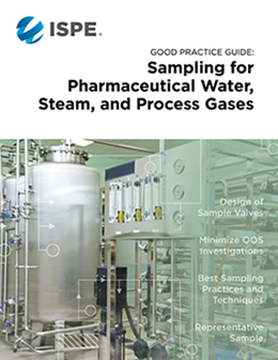Pharmaceutical Water Systems (T35)
Overview
Pharmaceutical Water is, perhaps, the most important of all pharmaceutical utilities. It is used as an excipient in many pharmaceutical formulations, as a cleaning agent, and as a separately packaged product diluent. In addition to non-compendial systems, pharmaceutical facilities typically include systems for delivering pharmacopoeial Purified Water (PW) Water for Injections (WFI), and Highly Purified Water (HPW).
This course has been substantially updated to feature the guiding principles of the ISPE Baseline Guide: Water and Steam Systems (Second Edition) with particular emphasis placed upon microbial control and laboratory water as well as key design philosophies. The principles of design and operation of water systems used directly in pharmaceutical manufacturing and laboratory applications, including the essential concepts and principles of systems used to generate USP, EP and non-compendial waters will be covered. These concepts include specification, design, operation, testing, and maintenance of equipment and systems for water generation.
What You Will Learn
- Examine methods for proper water quality selection and receive detailed guidance regarding the choice and use of appropriate construction materials and instrumentation. Particular attention will be paid to
- System and component sanitisation procedures and microbial control
- Guidance regarding appropriate monitoring programmes during ongoing operation as well as during initial system qualification.
Resources and Activities
- Pre-Course Work Materials
-
This course includes a pre-recorded Webinar that provides a review of the basics prior to the classroom course. Access information will be provided via email one week prior to the start of the training event.
-
The course will also cover regulatory requirements including USP, EP, and JP Monographs, the USFDA Guide to Inspections of High Purity Water Systems, current FDA views, and current Good Manufacturing Practice (cGMP) requirements. Common water system myths will also be explored and a variety of practical system designs will be evaluated for EP, EMA, USP and FDA compliance, as well as their advantages and disadvantages. Particular attention will be paid to system and component sanitization procedures and microbial control.
-
- Interactive Exercises
- Learning Assessments
- Baseline Guide Vol 4: Water & Steam Systems 3rd Edition
- Good Practice Guide: Sampling for Pharmaceutical Water, Steam, and Process Gases
Course Modules
- Regulatory
- Planning and Programming
- Basic Water Chemistry and Microbiology
- Pretreatment and Purification Processes
- Choice of Systems and Processes
- Basic Chemistry and Microbiology
- Storage and Distribution Configurations
- Storage and Distribution Design
- Rogue, Stainless Steel and Passivation
- Tradition, Risk and Science Based Water System
- System Sampling
Who Should Attend
- Pharmaceutical professionals who are new to water treatment systems or those with significant engineering expertise from another industry who need to learn about pharmaceutical water treatment systems
- Those with significant industry experience in other capacities that now have water generation system engineering and/or maintenance responsibilities and want to gain a fundamental understanding of the requirements for designing, building, operating, testing, and maintaining these systems
- Water treatment systems quality assurance and quality control specialists, manufacturing supervisors, technical support personnel, and all levels of management who want to gain a fundamental understanding of pharmaceutical water generation systems
- Professionals who are new to pharmaceutical water distribution systems
- Those with significant engineering expertise from another industry who need to learn about pharmaceutical water distribution systems
- Quality assurance and quality control specialists, manufacturing supervisors, technical support personnel, validation personnel, and all levels of management who want to gain a fundamental understanding of pharmaceutical water systems
Additional Course Details
Additional content from the ISPE Good Practice Guide: C&Q of Water and Steam Systems (Second Edition) will include the risk assessment and risk mitigation process used during design and qualification is crucial to ensuring product quality, allowing system designers and operators to gain process understanding of those product/process quality attributes which affect water or steam quality. The course will use a risk assessment example to determine the critical aspects, definition of critical quality attributes/critical process parameters (CQA/CPP), and identification/appropriate execution of quality indicating verification activities applied throughout the Validation Life Cycle. The course will include discussion of the upcoming European Pharmacopoeia regulatory change allowing alternative WFI production methods in addition to distillation. The change will align EP requirements closely with USP WFI production methods opening opportunities for membrane-based systems. The course will also include material from the new ISPE Good Practice Guide: Sampling for Pharmaceutical Water, Steam and Process Gases and will review optimi;zing sampling plans to significantly reduce operational costs.
Examples of a science and risk-based risk-management process for water and steam systems and typical system boundaries and critical aspects examples are discussed. Information is provided on the URs, FS, and how a QbD approach including Critical Aspects (CA) – CQAs and CPPs may be implemented. The module provides an alternative “science and risk-based” method that can be applied to the qualification of GMP water and steam systems.
Learning Objectives:
- Discuss regulatory requirements, current views and current Good Manufacturing Practices (cGMP) as they relate to pharmaceutical water systems
- Explain the effect of the cGMPs, FDA guidance documents, ISPE Baseline® Guides, and other reference documents on water system design, construction, maintenance and validation
- Compare common water process design alternatives for USP PW and WFI system
- Differentiate regulatory requirements from myths relative to water generation, distribution and storage systems
- Identify alternative system designs and their advantages and disadvantages
- Understand the importance of microbiological control and analyse the principles behind water system testing and qualification
- Understand the impact of water quality requirements (compendial and non-compendial) on water system operations
- Define the basic requirements for water distribution system component installation and overall system construction
- Integrate and streamline commissioning and validation activities
- The course will provide and understanding on the importance of C&Q (Verification) and how it fits into the Validation Life Cycle and the Project Lifecycle
- Explain and demonstrate an example of a science and risk based risk management process for water and steam systems and what are typical system boundaries and critical aspects
- Discuss Critical Aspects (CA) – CQAs and CPPs
- Discuss business essential parameters – key business considerations for design, construction, commissioning, and qualification. Some of these relate to non-product quality items like HSE considerations, IT, or other “commissioning only” project scope items.
- Provide identification of and discussion on project scope activities included in the qualification of water and steam systems in the context of full project delivery
- Provide information on the URs, FS, and how a QbD approach may be implemented.
- Ultimately, provide an alternative “science and risk-based” method that can be applied to the qualification of GMP water and steam systems
- Optimize sampling locations and frequency
Community of Practice (COP)
This training course is of particular interest to existing and future members of the ISPE Critical Utilities Community of Practice (COP).



